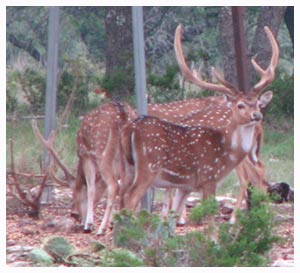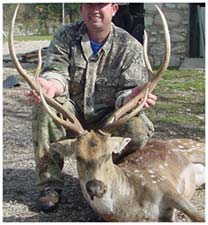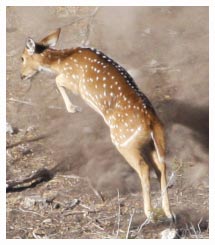Hunting Tips, Questions, Stories & Discussion
Focusing on managing Texas wildlife habitat and natural resources for native and exotic wild game species, for this and future generation of hunters and outdoor enthusiasts.Monday, June 22, 2009
How distracted are Axis does coming into a feeder location?
 This can provide some very unique and beautiful wildlife photography or videography options, plus of course you will also have a chance to check out the does that are at the feeder while they are all focused in on the battle.
This can provide some very unique and beautiful wildlife photography or videography options, plus of course you will also have a chance to check out the does that are at the feeder while they are all focused in on the battle.
What Axis doe hunting tips are available for handling the beautiful hide?
If you want a very memorable and gorgeous addition to your hide collection you will definitely want to take the hide of your Axis doe as part of your reward for a successful hunt. The absolutely stunning deep coloration and the white spots forming the lines down the length of the body are idea as a wall hanging, a throw for the back of a couch or over a table or even as a rug. Talk to the guide and have the hide packed appropriately so it can be cleaned and prepared by your taxidermists. It is important to get the hide in for preserving as quickly as possible as waiting too long will result in hair loss and may even make it impossible to preserve with the hair on.
How often are Axis does found away from the herd or group?
Axis doe hunting tips and strategies always include hunting within a herd as these does virtually never split away from their group. The herd instinct is so strong with these animals that they just don't wander off on their own. The only time you are likely to see an Axis doe by herself is during the birthing process and if she is injured or ill. It is amazing to watch these animals even when startled as they whole herd seems to move as one, staying in a group even when fleeing.
As such it is important for hunters to wait until the whole herd arrives to the feeder or along the path before deciding which Axis doe is the right one to hunt. By shooting too early you risk the chance of not seeing the whole herd as they will take a few minutes to all arrive at the feeder. Typically they approach the feeder slowly and carefully, then when they determine the coast is clear or there are other animals already at the feeder they are much less hesitant and more interested in feeding and defending their territory from other groups of does.
Labels: axis doe hunt, doe hunting in texas, texas axis doe hunts, trophy texas axis deer
Monday, February 2, 2009
What makes trophy Axis deer hunts so successful on the Escondido Ranch?
 Perhaps the single biggest advantage that Escondido Ranch has with regards to trophy Axis deer hunts is the river that flows through the lower part of the ranch, giving almost two miles of the exact terrain that the Axis deer loves. Since they like to spend time by the water and graze in the areas around water and around brushy areas, the riverbed is absolutely ideal for the species. Blinds that are placed in strategic locations along the river bed provide hunters the opportunity to get right to where the deer want to be, ensuring they will have a shot at bringing home a trophy axis deer. Hunts are conducted at the opportune times of the day, early morning and dusk feeding times, where guides can get the hunters settled into the blinds to wait for the big bucks to show up.
Perhaps the single biggest advantage that Escondido Ranch has with regards to trophy Axis deer hunts is the river that flows through the lower part of the ranch, giving almost two miles of the exact terrain that the Axis deer loves. Since they like to spend time by the water and graze in the areas around water and around brushy areas, the riverbed is absolutely ideal for the species. Blinds that are placed in strategic locations along the river bed provide hunters the opportunity to get right to where the deer want to be, ensuring they will have a shot at bringing home a trophy axis deer. Hunts are conducted at the opportune times of the day, early morning and dusk feeding times, where guides can get the hunters settled into the blinds to wait for the big bucks to show up.How big are the antlers seen on the deer taken at the Escondido trophy Axis deer hunts?
 on what the staff knows is available and how many of the large trophy Axis deer hunts are held during any one year. This management carefully monitors the numbers of trophy sized deer that are available as well as the younger bucks that are coming up for hunting in future years. Balancing the population of the entire herd only helps to provide hunters each year with an outstanding opportunity for bringing home a trophy set of antlers.
on what the staff knows is available and how many of the large trophy Axis deer hunts are held during any one year. This management carefully monitors the numbers of trophy sized deer that are available as well as the younger bucks that are coming up for hunting in future years. Balancing the population of the entire herd only helps to provide hunters each year with an outstanding opportunity for bringing home a trophy set of antlers.Labels: texas exotic deer hunting, trophy axis deer hunts, trophy texas axis deer
Archives
December 2008 January 2009 February 2009 April 2009 May 2009 June 2009 July 2009 August 2009 September 2009 November 2009 December 2009 January 2010 February 2010 March 2010 April 2010
Subscribe to Posts [Atom]
